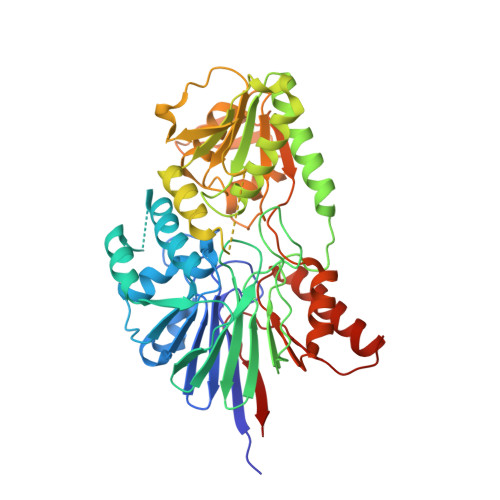Polyadenylation factor CPSF-73 is the pre-mRNA 3'-end-processing endonuclease.
Mandel, C.R., Kaneko, S., Zhang, H., Gebauer, D., Vethantham, V., Manley, J.L., Tong, L.(2006) Nature 444: 953-956
- PubMed: 17128255
- DOI: https://doi.org/10.1038/nature05363
- Primary Citation of Related Structures:
2I7T, 2I7V, 2I7X - PubMed Abstract:
Most eukaryotic messenger RNA precursors (pre-mRNAs) undergo extensive maturational processing, including cleavage and polyadenylation at the 3'-end. Despite the characterization of many proteins that are required for the cleavage reaction, the identity of the endonuclease is not known. Recent analyses indicated that the 73-kDa subunit of cleavage and polyadenylation specificity factor (CPSF-73) might be the endonuclease for this and related reactions, although no direct data confirmed this. Here we report the crystal structures of human CPSF-73 at 2.1 A resolution, complexed with zinc ions and a sulphate that might mimic the phosphate group of the substrate, and the related yeast protein CPSF-100 (Ydh1) at 2.5 A resolution. Both CPSF-73 and CPSF-100 contain two domains, a metallo-beta-lactamase domain and a novel beta-CASP (named for metallo-beta-lactamase, CPSF, Artemis, Snm1, Pso2) domain. The active site of CPSF-73, with two zinc ions, is located at the interface of the two domains. Purified recombinant CPSF-73 possesses RNA endonuclease activity, and mutations that disrupt zinc binding in the active site abolish this activity. Our studies provide the first direct experimental evidence that CPSF-73 is the pre-mRNA 3'-end-processing endonuclease.
- Department of Biological Sciences, Columbia University, New York, New York 10027, USA.
Organizational Affiliation:


















